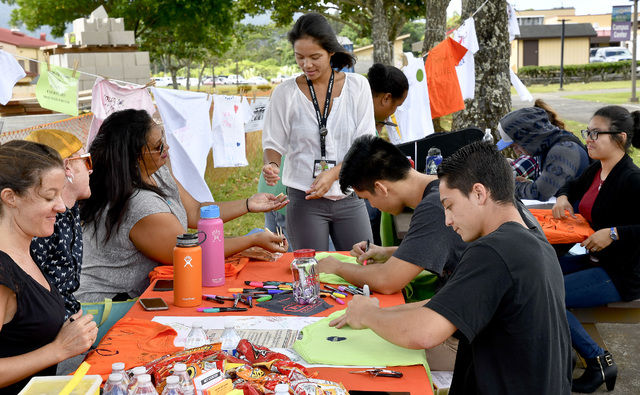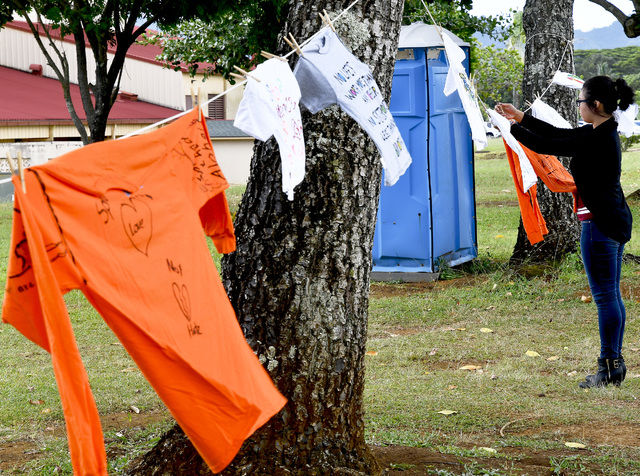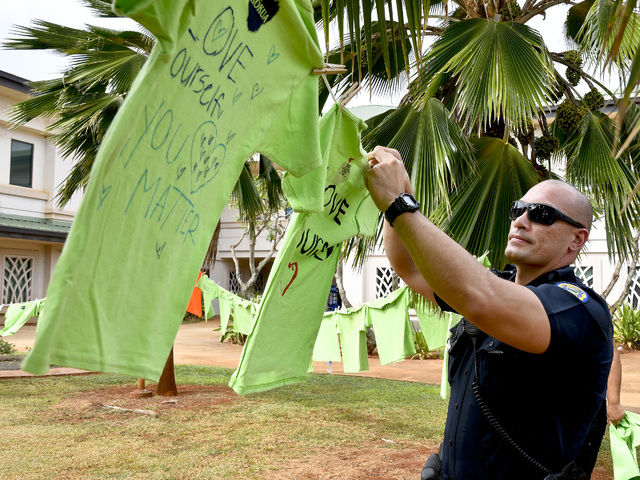LIHUE — No one is immune to the effects of domestic violence, said Renae Hamilton-Cambelih. “We are learning more about the devastating long-term effects domestic violence has on children,” said Hamilton-Cambelih, executive director of the YWCA of Kauai. “Although children
LIHUE — No one is immune to the effects of domestic violence, said Renae Hamilton-Cambelih.
“We are learning more about the devastating long-term effects domestic violence has on children,” said Hamilton-Cambelih, executive director of the YWCA of Kauai. “Although children are less likely than women to be direct victims of domestic violence, they are often present when violence occurs.”
October is domestic violence month, which was designated by the National Network to End Domestic Violence, or NNEVD, in an effort to raise awareness to domestic violence and find ways to end it.
Witnessing violent acts can have long-term consequences on brain development and emotional well-being, as well as having an effect on a child’s sense of safety and security, she said.
“Domestic violence must be stopped for the sake of our keiki,” said Hamilton-Cambelih.
Justin Kollar, prosecuting attorney, said children who grow up witnessing violent crimes are susceptible to mimicking that behavior.
“People who grow up witnessing violence in the household are more likely to believe that type of behavior is normal,” he said.
Trending on Kauai
Domestic violence on Kauai is a major problem and goes hand-in-hand with drug and alcohol abuse, which is a multigenerational trend, Kollar added.
On Kauai, the Office of the Prosecuting Attorney receives more than 400 cases per year related to domestic violence, Kollar said.
“Our domestic violence case load is heavy, but manageable,” he said.
A majority of domestic violence cases on the Garden Isle are misdemeanors, in which one family or household member causes bodily injury to another family member. If the suspect chokes the victim or the offense is committed in the presence of a minor under 14, the case moves to felony charges, Kollar said.
Getting help
To help victims of domestic violence, YWCA offers a Family Violence Shelter that offers emergency shelter, counseling, support groups, safety planning and assistance with protective orders.
Before meeting with clients, shelter staff undergo “extensive training” that includes a 35-hour course to ensure that each staff member, or advocate, has the client/counselor confidentiality privilege, Hamilton-Cambelih said.
The training “is victim-centered and our priority is to empower individuals to make the best informed decisions for themselves and their families,” she said. “Often victims of domestic violence think they have no options or have been threatened and given misinformation from the abuser.”
Between 50 and 80 people take refuge at the shelter yearly. The length of stay depends on the individual’s situation. Children and infants often stay in the shelter, said Hamilton-Cambelih.
“One of the biggest barriers for domestic violence survivors to start new lives, violence free, is finding affordable housing,” she said.
Victims of domestic violence can also call the YWCA 24-hour crisis hot-line. The YWCA averages about 800 calls annually, said Hamilton-Cambelih.
Litigating cases
When it comes to prosecuting domestic violence cases, making sure victims feel safe enough to cooperate with the police and attorneys is the biggest challenge, Kollar said.
“Especially in a small community like Kauai, victims may feel helpless to escape their situation or fear their abuser to the extent that they later recant or become reluctant to participate in prosecution,” Kollar said.
As the case progresses, the attorneys may have to convince a victim to face their abuser or allow the alleged attacker go free, without consequences.
“They’re difficult cases but we have passionate and talented people working on them and that makes a difference,” he said.
In an effort to make the legal process easier for every party involved, the Prosecutor’s Office has hired a victim advocate, refitted the interview room, which offers a more welcoming environment for interviews, and is working to relocate the victim-witness program offices to an off-site location, Kollar said.
Moving forward
It takes departments and organizations like the Office of the Prosecuting Attorney, Kauai Police Department and the YWCA to properly address domestic violence on Kauai, said Darryl Perry, chief of KPD.
“The KPD understands that domestic violence negatively impacts our entire community and therefore, we investigate these cases very aggressively while working collaboratively with the Office of the Prosecuting Attorney,” he said. “We also partner closely with service agencies, such as the YWCA, to ensure victims receive necessary support. As a caring community we need to take a stand against these violent acts by bringing awareness to the problem and not standing silent.”
Moving forward, the way to combat domestic violence on the island is holding the accused abusers responsible and not making excuses for their behavior, Hamilton-Cambelih said.
Removing common misconceptions is also important, she added.
“The idea that it is a ‘family’ matter and therefore it’s not important to intervene is still prevalent,” she said. “Also, the idea that the person being abused has somehow ‘deserved’ it is very harmful and doesn’t hold abusers accountable.”
Domestic violence should be addressed as a mental health problem, Kollar said.
“We need to provide comprehensive support for victims who would like to get out of their situation and we also need to help families develop ways of dealing with financial and emotional stress so that people don’t need to turn to alcohol or drugs for their escape,” he said.




